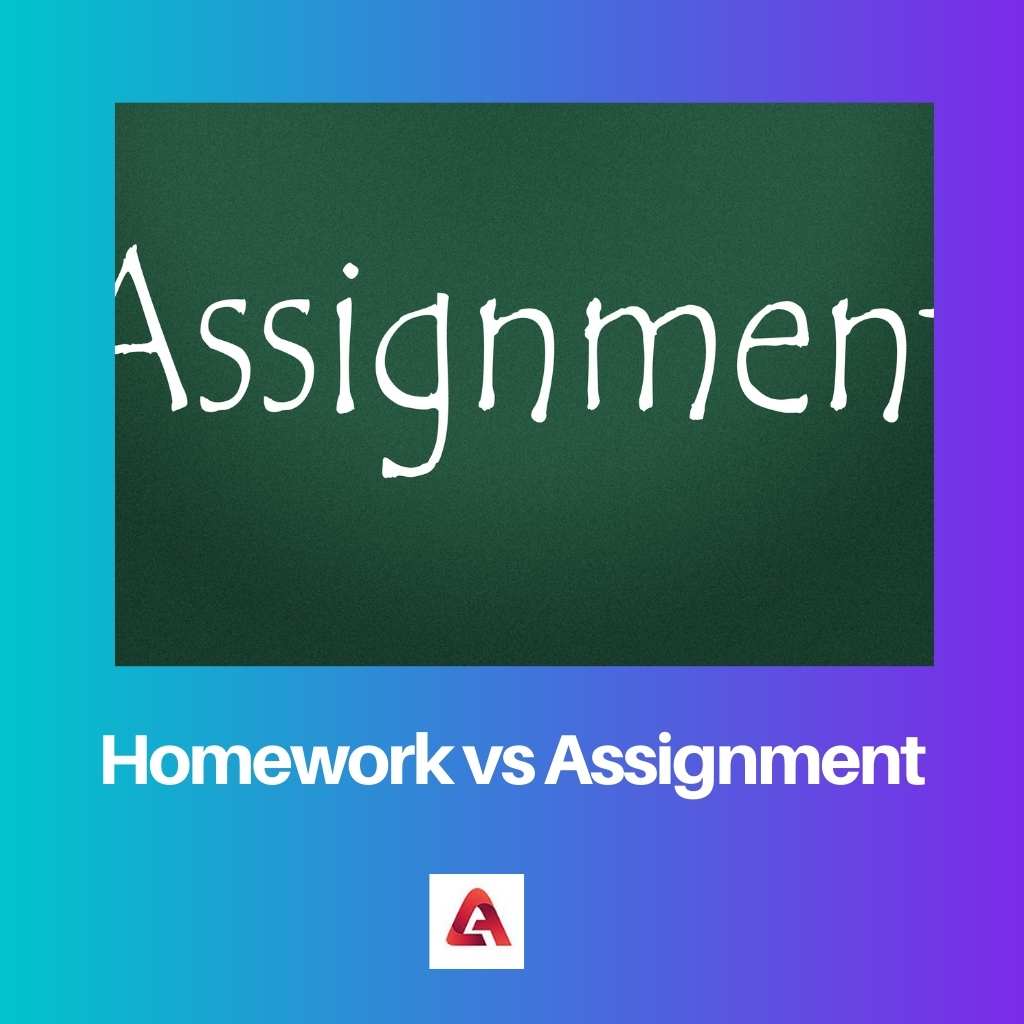
Home » Education » What is the Difference Between Homework and Assignment

What is the Difference Between Homework and Assignment
The main difference between homework and assignment is that homework is a task or a work assigned to a student generally by a teacher to be completed outside the classroom setting, most probably at home, while an assignment is a task assigned to a student to be completed within the course of a particular study.
Assignments and homework vary from one another due to a wide range of distinctive elements such as the objective or the purpose of the task, main functions, and the benefits received.
Key Areas Covered
1. What is Homework – Definition, Features 2. What is Assignment – Definition, Features 3. Similarities Between Homework and Assignment – Outline of Common Characteristics 4. Difference Between Homework and Assignment – Comparison of Key Differences

What is Homework
Homework refers to the tasks assigned to the students by the schoolteachers. They expect students to carry out the task during non-school hours. Teachers often give homework to complete at home in order to make their students practice the learning material already taught. Their aim is to reinforce learning and facilitate the mastery of specific competencies and skills .
Sometimes, a student might get preparation assignments as homework. The purpose of such homework is to introduce the student to the study material that the teacher will present in future lessons. Furthermore, it would help students to obtain the maximum benefit once the new material is being taught in class.

On the other hand, homework sometimes facilitates the transfer of previously acquired skills to new situations. For example, the students might learn in class about factors that led to World war I. Then, as homework, the teacher would ask the students to find out the factors that led to World war II. Here, the teacher gives an integration homework, which requires the student to apply separately learned skills to create a single product, such as science projects, newspaper reports, or creative writing.
In addition, homework can be used to build up proper communication between parents and children, as a constructive method of punishment and also to make the parents aware of what is happening in school.
What is Assignment
If you are a student, you might think that it is not your responsibility to learn by yourself; rather, it is the job of the teacher to teach you. But, a teacher cannot teach every little thing in a particular unit or subject to the students.
Such a spoon-feeding method of imparting knowledge can negatively influence the learning capabilities and the academic career of a student. Especially in academic establishments such as colleges or universities, teachers expect the students do some research to grasp the untaught concepts and to explore the subject on their own instead of teaching everything to the students using a lecture method.

The actual purpose of giving assignments is to enhance the learning skills of the students. This enables the students to occupy their brains more and more. Academic assignments improve the creativity of the students as they naturally acquire and learn a lot when they read or practice a subject or art on their own. Therefore, the main reason for giving assignments is to provide the student with a platform to practice and explore knowledge about a subject on their own.
Similarities Between Homework and Assignment
- Both aim at enhancing the learning skills of the students.
- Teachers or professors assign them to the students.
- It is possible to grade both homework and assignments.
Difference Between Homework and Assignment
Homework is a work or a task assigned to a student by a teacher to be completed during a non-school hour, whereas an assignment is a task assigned to a student in the course of study. In contrast to homework, an assignment usually provides the student with a clue about the objectives of the assigned task.
The main purpose of an assignment is to help a student understand the studying process well. In contrast, homework basically helps the student to improve his/her skills.
Main Function
An assignment can be used to figure out what should be taught, while homework is basically used to identify the challenges encountered by students on a particular topic.
Some advantages of assignments include supporting students to revise a particular topic and boosting the students’ confidence, whereas homework becomes helpful in understanding a specific topic and when preparing for an exam.
In brief, the main difference between homework and assignment is that homework is assigned to be completed outside the classroom while assignments are assigned to be completed within the course of a particular study. Nonetheless, no matter how beneficial they can be, for most students, homework and assignments are a massive source of unhappiness and irritation.
1. Levy, Sandra. “ Why Homework Is Bad: Stress and Consequences .” Healthline , Healthline Media.
Image Courtesy:
About the Author: Anuradha
Anuradha has a BA degree in English, French, and Translation studies. She is currently reading for a Master's degree in Teaching English Literature in a Second Language Context. Her areas of interests include Arts and Literature, Language and Education, Nature and Animals, Cultures and Civilizations, Food, and Fashion.
You May Also Like These
Leave a reply cancel reply.

What is the difference between assignment and homework ?
Quick word challenge
Quiz Review
Score: 0 / 5
Homework vs Assignments: Key Differences and How to Effectively Manage Them

Homework is tasks or exercises assigned to students to complete outside of class. It is often used to reinforce or practice the material covered in class and may be graded or ungraded.
Assignments , on the other hand, are tasks or exercises given as part of a class or course. They are typically completed in class or under the instructor’s guidance and usually contribute to a student’s overall course grade.
Table of Contents
Purpose of homework and assignments
The purpose of homework is to allow students to practice and reinforce the material covered in class. It helps students to solidify their understanding of the material and prepares them for exams and other assessments.
Assignments, on the other hand, are used to evaluate a student’s understanding of the material and ability to apply it in a real-world setting.
Importance of understanding the difference between homework and assignments
Understanding the difference between homework and assignments is important because it can help students to manage their time more effectively and prioritize their tasks.
It can also help them understand the purpose of the tasks they are being assigned, increasing their motivation to complete them.
Differences between homework and assignments – Definition and examples of homework
1. Typically given to students to be completed outside of class: Homework is usually assigned outside of class, often to reinforce the material covered in class.
For example, a student might be assigned to read a chapter from a textbook and answer questions about it as homework.
2. Often used to reinforce or practice the material covered in class: Homework is designed to allow students to practice and reinforce the material covered in class.
For example, a student might be assigned math problems as homework to practice solving equations.
3. May be graded or ungraded: Homework may or may not be graded, depending on the teacher or school’s policy. Some homework may be used as a formative assessment to gauge student understanding, while others may not be graded.
Definition and examples of assignments
1. Given as part of a class or course: Assignments are typically given as part of a class or course and are used to evaluate a student’s understanding of the material. For example, a student might be assigned to write an essay as part of an English class.
2. Typically completed in class or under the instructor’s guidance: Assignments are usually completed in class or under the instructor’s guidance. This allows the teacher to provide guidance and support as the student works on the assignment.
For example, a student might complete a group project in class as part of a social studies assignment.
3. Usually graded and contribute to a student’s overall course grade: Assignments are usually graded and contribute to a student’s overall course grade.
For example, a student’s final research paper in a history class might count for 30% of the student’s final grade.
Similarities between homework and assignments
Both are designed to help students learn and practice material: Homework and assignments are designed to help students learn and practice material.
They provide opportunities for students to engage with the material and apply what they have learned in a real-world setting.
Teachers or instructors usually assign both: Homework and assignments by teachers or instructors responsible for creating and grading the tasks.
Both require effort and time to complete: Both homework and assignments require effort and time to complete.
Students will need to set aside dedicated time to work on the tasks and may need to use study strategies and time management techniques to complete them effectively.
How to effectively manage homework and assignments
Time management strategies.
1. Setting aside dedicated time for homework and assignments: One of the most important things students can do to effectively manage their homework and assignments is to set aside dedicated time to work on them.
This might mean setting aside specific hours of the day to work on homework or scheduling blocks of time to work on assignments.
2. Prioritizing tasks based on importance and due date: Another important time management strategy is prioritizing tasks based on importance and due date.
This means focusing on the most important tasks and working on them before moving on to less important ones.
Study Strategies
1. Breaking tasks into manageable chunks: One effective study strategy is to break tasks down into manageable chunks. This means breaking a large task, such as writing a research paper, into smaller parts, such as researching, outlining, and writing.
2. Using mnemonic devices or flashcards to memorize information: Another effective study strategy is to use mnemonic devices or flashcards to memorize information. Mnemonic devices, such as acrostics or rhymes, can help students to remember information more easily.
Flashcards are also useful for memorizing definitions, formulas, and other important information.
Tips for staying motivated
1. Setting goals and rewards: Goals and rewards can help students stay motivated as they work on their homework and assignments.
For example, a student might set a goal to finish a research paper by a certain date and reward themselves with a movie night or a favorite food.
2. Breaking up long study sessions with short breaks: Breaking up long study sessions with short breaks can help students to stay focused and motivated.
This might mean taking a 5-minute break after every hour of studying or a more extended break after completing a particularly difficult task.
This post discussed the differences and similarities between homework and assignments. We also discussed strategies for effectively managing homework and assignments, including time management techniques, study strategies, and tips for staying motivated.
Final thoughts on the importance of understanding the difference between homework and assignments:
Understanding the difference between homework and assignments is essential for students because it can help them to manage their time more effectively and prioritize their tasks.
Encourage readers to use the strategies discussed in the post to manage their homework and assignments effectively: We hope that the strategies discussed in this post will be helpful for students as they work to manage their homework and assignments.
By using effective time management techniques, study strategies, and tips for staying motivated, students can improve their ability to complete tasks and achieve academic goals.
Homework V/s. Assignment
Share this:.
Assignment vs. Homework
What's the difference.
Assignment and homework are both tasks given to students by teachers to reinforce learning and assess understanding. However, there are some key differences between the two. Assignments are typically larger projects or tasks that require more time and effort to complete, while homework is usually smaller, daily tasks that can be completed in a shorter amount of time. Assignments often involve more critical thinking and creativity, while homework is more focused on practicing and applying concepts learned in class. Overall, both assignments and homework play an important role in the learning process and help students develop their skills and knowledge.

Further Detail
Assignments and homework are both tasks given to students by teachers to reinforce learning. Assignments are typically more formal and structured tasks that are given to students to complete outside of class. Homework, on the other hand, is a broader term that encompasses any work that students are expected to complete outside of class time.
Assignments are usually given less frequently than homework. They are often larger tasks that require more time and effort to complete. Homework, on the other hand, is typically given on a daily or weekly basis and is meant to be completed in a shorter amount of time.
Assignments tend to cover a broader scope of material than homework. They may require students to demonstrate a deeper understanding of a topic or to apply concepts in a more complex way. Homework, on the other hand, is usually more focused and may involve practicing specific skills or reviewing material covered in class.
Assignments can come in a variety of formats, including essays, research papers, projects, presentations, and more. They often require students to engage in higher-order thinking skills and to demonstrate their understanding in a creative or analytical way. Homework, on the other hand, is typically more straightforward and may involve completing worksheets, answering questions, or reading assigned material.
Assignments are usually graded more rigorously than homework. They may account for a larger portion of a student's overall grade and may be assessed based on specific criteria or rubrics. Homework, on the other hand, is often graded on completion or effort and may not carry as much weight in terms of a student's final grade.

Time Management
Assignments often require more advanced time management skills than homework. Students may need to plan ahead and break down larger tasks into smaller, manageable steps in order to complete assignments on time. Homework, on the other hand, is usually more straightforward and can be completed in a shorter amount of time, making it easier for students to fit into their daily schedules.
The purpose of assignments is to deepen students' understanding of a topic, to encourage critical thinking and problem-solving skills, and to provide opportunities for creativity and self-expression. Homework, on the other hand, is meant to reinforce learning, to practice skills, and to provide feedback to both students and teachers on the progress of learning.
Collaboration
Assignments may involve more opportunities for collaboration than homework. Students may be asked to work in groups or pairs to complete assignments, which can help them develop teamwork and communication skills. Homework, on the other hand, is usually completed independently, although students may seek help from peers or parents if needed.
Assignments often provide more detailed feedback to students than homework. Teachers may offer comments, suggestions, and grades on assignments to help students understand their strengths and areas for improvement. Homework, on the other hand, may be graded quickly and may not always include detailed feedback, although teachers may use homework completion as a way to monitor student progress.
In conclusion, assignments and homework both play important roles in the education system. While assignments tend to be more formal, structured, and in-depth tasks that require advanced skills and knowledge, homework is typically more frequent, focused, and practice-oriented. Both assignments and homework provide valuable opportunities for students to learn, practice, and demonstrate their understanding of course material.
Comparisons may contain inaccurate information about people, places, or facts. Please report any issues.
Homework vs. Assignment: What's the Difference?
Key Differences
Comparison chart, homework and assignment definitions, what is an assignment, what can assignments include, is all homework considered an assignment, can assignments be part of a job, what is homework, are all assignments homework, where is homework typically completed, do assignments require research, how often do students get homework, what's the main purpose of homework, can assignments be collaborative, are assignments time-bound, do homework assignments vary by subject, is the difficulty of assignments subject-specific, are assignments always for a grade, can homework include reading and writing tasks, do assignments contribute to final grades, is feedback provided on homework, is homework used for assessment, can homework be creative.

Trending Comparisons

Popular Comparisons

New Comparisons


Homework vs Assignment: Difference and Comparison
The most significant aspect of a school is learning a subject and implementing what the students have learned. Assignments and homework are required for learning any subject from the ground up.
These procedures aid in the improvement of educated people’s skills and knowledge. Students may be confused by both terms at times, but they are not interchangeable.
Assignments and homework are both crucial for students’ development.
Key Takeaways Homework is assigned work completed outside of class time, while assignments encompass both in-class and out-of-class tasks. Homework reinforces and extends classroom learning, while assignments may include presentations, group projects, or quizzes. Teachers assign homework to help students develop study habits and time management skills, while assignments can assess a broader range of learning objectives.
Homework vs Assignment
Homework means any work that students are expected to do at home, including reading assignments, practice exercises, and studying for tests. Assignment is a specific task or job that is allocated to someone as part of a job or course of study, to complete and submit by a given deadline.

Homework is the work that is assigned by the school teachers or educators to their students to complete. The work given is meant to be completed by the student after school hours, mainly at home.
The origin of the word homework came into existence back in 1350-1400 years. And the benefits behind this practice are that students get prepared for their exams, understand the concepts, can recognize different difficult topics, etc.
Assignments include the tasks that are to be completed by the students or children within a certain amount of time. This work may also be known as work assignments for the students as part of their education.
Assignments can be given or prepared in different ways, and they may be – written assignments, practical assignments, art assignments, fieldwork assignments, online assignments, and many others.
Their main motive is to guarantee that students must comprehend the topic or concept completely.
Comparison Table
What is homework.
Homework is defined as the duties that are assigned to children by their teachers at school. Students are expected to complete the job outside of school hours.
Teachers frequently assign homework for pupils to perform at home for them to put what they’ve learned into practice. They are designed to reinforce learning and make mastering specific competencies and skills easier.
As homework, a student may be given preparation assignments. The objective of assigning homework is to introduce the student to the study material that will be presented in future lessons by the teacher.
Furthermore, if the new content is taught in class, it will assist pupils in getting the most out of it.
In addition, homework can be used to build up proper communication between parents and children, which makes the parents aware of what is happening in school.

What is Assignment?
As a student, you may have believed that it is the teacher’s role or responsibility to teach the students rather than the student’s responsibility to learn on their own.
However, we must recognize that teachers are unable to explain every detail of a unit or subject to their students. A spoon-feeding approach of transferring knowledge can harm a student’s learning ability and academic career .
Teachers, particularly in academic institutions such as colleges and universities, expect students to conduct some research to grasp untaught topics and to explore the subject on their own rather than lecturing them on everything.
The goal of assigning such tasks is to improve the students learning abilities. This allows students to keep their minds occupied for longer periods.
Students’ creativity is enhanced by academic assignments because they naturally absorb and learn a lot when they read or practice a subject or art on their own.
As a result, the major purpose of assigning assignments is to provide students with a chance to exercise and explore information about a subject on their own.

Main Differences Between Homework and Assignment
- If homework is to be defined in a sentence, then this can be stated that the type of work which is given to the students and is to be completed outside the traditional classroom setting or at their home whereas comparatively, on the other hand, the assignments can be stated as the work prescribed or assigned to be completed during the course duration time.
- The word homework came into existence back in 1350-1400 and is derived from French phrases that are ‘Middle English Assignment’ or ‘Medieval Latin assignamentum’ while comparatively, on the other hand, the word assignment came into existence after the late Middle English .
- The purpose of giving homework to students is to improvise the skills of the students while comparatively, on the other hand, the purpose of giving assignments to students is to explore the content and topic beyond the textbook knowledge and also understand the learning process.
- The main function behind homework is to find out the difficulties that might be faced by the students while comparatively, on the other hand, the main function behind the assignment is to retrieve or check the knowledge gained by the students.
- The main advantages of giving homework are that it helps to prepare for the examination, and makes the concepts easy to understand whereas comparatively, on the other hand, the main advantages of assigning assignments to students are that it helps in revision , gaining extra knowledge sometimes, boosts self-confidence within the child.

- https://www.sciencedirect.com/science/article/abs/pii/S027277571000083X
- https://psycnet.apa.org/record/2009-01936-006
- https://www.tandfonline.com/doi/abs/10.1207/s15430421tip4303_6
- https://www.clutejournals.com/index.php/TLC/article/view/7751
Last Updated : 21 July, 2023

I’ve put so much effort writing this blog post to provide value to you. It’ll be very helpful for me, if you consider sharing it on social media or with your friends/family. SHARING IS ♥️

Emma Smith holds an MA degree in English from Irvine Valley College. She has been a Journalist since 2002, writing articles on the English language, Sports, and Law. Read more about me on her bio page .
Share this post!
Leave a comment cancel reply.
Save my name, email, and website in this browser for the next time I comment.
Want to save this article for later? Click the heart in the bottom right corner to save to your own articles box!
“Assignment” vs. “Homework”: What’s the Difference?

The difference between “assignment” and “homework”
- Assignments are typically more complex and involve more preparation and work than homework.
- Assignments can be given to test a student's knowledge and understanding of a specific topic, while homework is meant to reinforce what was already learned in class.
- Homework can be given on a daily basis, while assignments often have specific due dates and may account for a larger portion of a student's grade than homework.
What is the definition of “assignment” and “homework”?
- An assignment is a task or project given to a student by a teacher or professor.
- It is often given to test a student's understanding and knowledge of a particular topic or subject.
- Assignments are typically scheduled and have specific due dates for completion.
- Homework refers to work assigned by a teacher to be completed outside of the classroom.
- It is typically given to reinforce a student's understanding and practice of concepts learned in class.
- Homework can be given on a daily basis.
Which is the more popular variant on the Internet?
- My professor gave us an assignment to research the effects of climate change on the polar bear population.
- I struggled with the programming assignment and had to ask my friend for help.
- The deadline for the assignment is next Wednesday.
- I always try to finish my homework on Friday night so that I can enjoy the weekend.
- My son has a lot of homework to complete tonight so he won't have time to watch TV.
- The teacher assigned a chapter to read for homework.

Related articles

Copyright ⓒ 2023 Data B Co., Ltd. All rights reserved.

Homework vs. Assignment — What's the Difference?
Difference Between Homework and Assignment
Table of contents, key differences, comparison chart, compare with definitions, common curiosities, can homework be considered an assignment, can assignments be collaborative, do all assignments count towards final grades, what is an assignment, are assignments only given for completion outside of class, is homework effective in improving academic performance, how much time should be spent on homework, why are assignments important in education, how does homework differ from classwork, what is homework, what role does feedback play in assignments, do assignments help in learning beyond the classroom, how can students manage homework effectively, why might some students struggle with assignments, what strategies can teachers use to make assignments more effective, share your discovery.

Author Spotlight
Popular Comparisons

Trending Comparisons

New Comparisons

Trending Terms


IMAGES
VIDEO
COMMENTS
The main difference between homework and assignment is that homework is a task or a work assigned to a student generally by a teacher to be completed outside the classroom setting, most probably at home, while an assignment is a task assigned to a student to be completed within the course of a particular study. […]
1. Online Learning. In the age of online learning, the terms homework and assignment are used interchangeably. In this context, an assignment is often used to refer to any task that is given to students to complete outside of class time, whether it is online or offline. Homework, on the other hand, is often used to refer specifically to tasks ...
homework. ? 1 `assignment'. An assignment is a task that someone is given to do, usually as part of their job. My first major assignment as a reporter was to cover a large-scale riot. An assignment is also a piece of academic work given to students. The course has some heavy reading assignments.
Homework is tasks or exercises assigned to students to complete outside of class. It is often used to reinforce or practice the material covered in class and may be graded or ungraded. Assignments, on the other hand, are tasks or exercises given as part of a class or course. They are typically completed in class or under the instructor’s ...
However, there are some key differences between the two. Assignments are typically larger projects or tasks that require more time and effort to complete, while homework is usually smaller, daily tasks that can be completed in a shorter amount of time. Assignments often involve more critical thinking and creativity, while homework is more ...
Homework is often designed to reinforce classroom learning and is specific to school or educational settings. However, assignments can be more diverse, ranging from academic essays to workplace projects, not confined to the educational context.
Homework is assigned work completed outside of class time, while assignments encompass both in-class and out-of-class tasks. Homework reinforces and extends classroom learning, while assignments may include presentations, group projects, or quizzes. Teachers assign homework to help students develop study habits and time management skills, while ...
Assignment. An adjunct in the brackets near the ‘homework’ notion says that the nature of these two concepts differ a lot depending on the place where they are done. Assignments can even be a part of classwork where students work on a project or research a particular issue. This can also be a practical task run in class to comprehend some ...
An assignment is a task or project given to a student by a teacher or professor. It is often given to test a student's understanding and knowledge of a particular topic or subject. Assignments are typically scheduled and have specific due dates for completion. Homework refers to work assigned by a teacher to be completed outside of the classroom. It is typically given to reinforce a student's ...
Key Differences. Homework is designed to reinforce what has been taught in class, requiring students to practice or integrate skills and knowledge independently. Whereas, assignments may encompass a wider range of tasks including projects, research, and practice work, which can be done both in and out of class. 10.